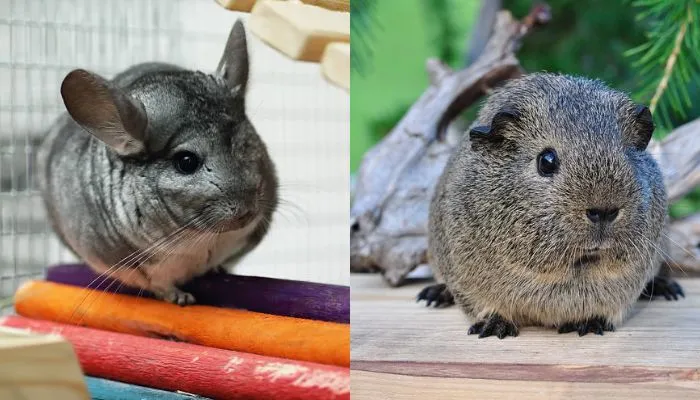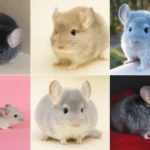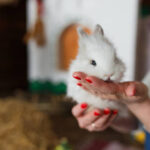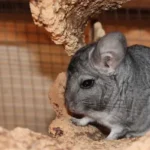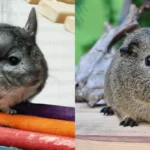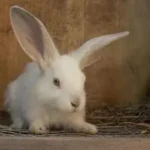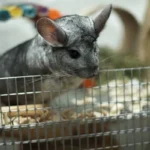Picking a pet is a critical choice that requires cautious thought of different variables. Two famous little warm-blooded creatures frequently considered pets are chinchillas and guinea pigs. Both delightful and novel in their ways, these creatures have unmistakable qualities that can extraordinarily impact the similarity with various ways of life. In this article, we will investigate the critical parts of chinchillas and guinea pigs, assisting you with arriving at an educated conclusion about which one is the ideal ally for your way of life.
Characteristics of Chinchilla vs Guinea Pig:
Chinchillas Characteristics:
- Physical Traits: Chinchillas are known for their unmistakable actual elements. These little rodents gloat a minimal size, normally going from 9 to 15 crawls long. Their fur is uncommonly delicate and thick, with a scope of varieties including dim, beige, and white. The sumptuous fur adds to their appeal as well as presents novel prepping challenges.
- Behavior: Chinchillas are primarily nocturnal or crepuscular, meaning they are most active during the evening and night. This behavior may impact the level of interaction and engagement your pet can have with you during the day. Additionally, chinchillas are social animals, often thriving in pairs or small groups. Understanding their social nature is crucial for providing them with an enriching environment.
- Housing Requirements: It’s important to carefully consider a chinchilla’s demands while designing a living area for them. Their cage must be roomy enough to allow them to walk about, climb, and play. Because chinchillas are temperature sensitive as well, it is best to keep them in a cool, dry area to avoid heat stress. To stimulate the mind, the cage arrangement should have objects like chew toys, platforms, and hiding places.
Guinea Pigs Characteristics:
- Physical Traits: Guinea pigs, sometimes known as cavies, are between 8 and 12 inches long, making them somewhat bigger than chinchillas. They have a variety of colors and patterns for their fur, and they frequently vocalize in a way that sounds like a whistle. Compared to chinchillas, guinea pigs are heavier and have a rougher coat.
- Behavior: Guinea pigs are diurnal, meaning they are more active during the day, in contrast to chinchillas. They may become more approachable for engagement during the day as a result. Due to their high level of socialization, guinea pigs do best in groups with other guinea pigs. They are excellent choices for families or individuals who can offer them company because of their gregarious disposition.
- Housing Requirements: Additionally, guinea pigs need a well-planned living area. Because wire-bottomed cages might injure their sensitive feet, a roomy cage with a sturdy floor is necessary. Chew toys, hiding places, and tunnels are just a few of the enrichment materials that guinea pigs can benefit from. It is essential to their well-being to give them a tidy and cozy space.
Care and Maintenance Chinchilla vs Guinea Pig:
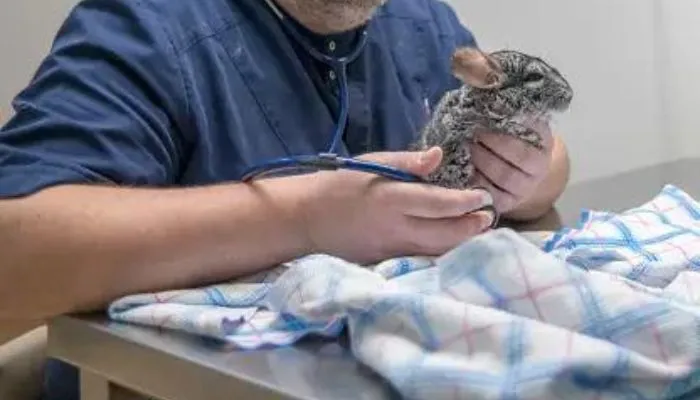
1- Diet and Nutrition:
- Chinchillas have nutritional needs that must be satisfied to maintain their health and well-being. High-fiber hay should be the main component of their food, with chinchilla pellets and occasional treats added for flavor. Because chinchillas are prone to obesity and digestive problems, it’s important to avoid diets heavy in fat and sugar.
- In contrast, guinea pigs eat a simpler diet, but they still need access to fresh hay all the time to maintain good oral health. Along with regular feeding of fresh veggies like bell peppers, leafy greens, and carrots, a balanced guinea pig pellet is advised. Guinea pigs require vitamin C, thus it’s important to include diets high in vitamin C.
2- Grooming Requirements:
- Chinchillas: Because of their thick hair, chinchillas need to be groomed frequently to avoid matting and fur blockages, which can be detrimental to their health. Using specific chinchilla dust, dust baths are an essential component of their grooming regimen. This aids in keeping their coat healthy and clean.
- Guinea Pigs: In terms of grooming, guinea pigs typically require little upkeep. Frequent brushing minimizes shedding and keeps their coat tidy. Guinea pigs do not require dust baths, in contrast to chinchillas. To avoid overgrowth and potential damage, both chinchillas and guinea pigs require regular nail clipping.
3- Health Care:
- Chinchillas: Health issues including dental problems and fur-related blockages are more common in this species. Regular checkups by veterinarians are essential to monitor both oral and overall health. Selecting a veterinarian experienced in treating exotic animals is crucial, as chinchillas have unique medical needs.
- Guinea Pigs: Despite their tough exterior, guinea pigs are susceptible to respiratory illnesses and dental issues. Regular veterinarian exams are necessary for the early detection of health problems and the administration of preventative care. Selecting a physician who specializes in treating small animals ensures that your guinea pig will receive the best care possible.
Interaction and Playtime Requirements:
- Chinchillas are lively animals who like to explore and climb. For their mental and physical stimulation, a place outside the cage that is secure and supervised during playtime is crucial. Tunnels and platforms are examples of interactive toys and activities that improve children’s well-being. The relationship between chinchillas and their owners is strengthened by consistent, careful treatment that fosters trust.
- These are gregarious, sociable creatures who love company. Although they may live alone, having a same-sex companion makes them happier overall. Their well-being depends on daily connection, which includes chatting to them and gently handling them. Their living environment is improved and their mental stimulation is maintained by providing a range of toys, tunnels, and hiding places.
Cost Considerations Chinchilla vs Guinea Pig:
1- Initial Setup Costs:
- Chinchillas: A roomy cage, hiding places and other accessories, and proper bedding are included in the initial setup expenditures for a chinchilla. A dust bath house and premium chinchilla dust are also necessities for chinchillas. Your chinchilla will live in a cozy and stimulating environment if you get these things. Furthermore, because chinchillas require specialized care, veterinarian treatment may be more expensive.
- Guinea Pigs: Because wire-bottomed cages might damage their sensitive feet, guinea pigs need a large cage with a solid floor. Tunnels, hiding places, and chew toys are examples of accessories that improve their quality of life. Even though guinea pig setup costs are often lower than those of chinchillas, it’s still important to budget for continuing costs, such as veterinarian care.
2- Ongoing Expenses:
- Chinchillas: High-fiber hay and chinchilla pellets are two of their special dietary requirements. Regular dust baths require specialized dust, which is an extra recurring expenditure. Chinchillas have particular health requirements, thus veterinary care for them may be more costly than for other small mammals.
- Guinea Pigs: Daily portions of fresh vegetables a steady supply of fresh hay and balanced guinea pig pellets are necessary for guinea pigs. Even though their diet is simple, giving them a range of fruits and vegetables is beneficial to their health. Preventive care and treating any health issues need routine veterinarian examinations.
Veterinary Care and Potential Emergencies
- Chinchillas: Because they are exotic pets, chinchillas may need veterinary treatment from specialists who have dealt with tiny animals in the past. Dental disorders, obstructions caused by fur, and respiratory disorders are frequent health conditions that may require veterinary care. Owners of chinchillas must always be ready for any emergency.
- Guinea Pigs: Despite their inherent hardiness, guinea pigs are prone to skin, tooth, and respiratory illnesses. Regular veterinarian examinations are necessary to keep them healthy, and owners need to be ready for any unexpected situations. For prompt intervention, it helps to have a basic grasp of prevalent health disorders and their symptoms.
Compatibility with Different Lifestyles:
- Chinchillas: Because of their small size, chinchillas are typically a good fit for apartment life. But, if the cage is kept in the same room as them, you should take into account that they are nocturnal or crepuscular animals, as their increased activity during the night may disturb your sleep. In residential environments, proper ventilation and temperature management are essential.
- Guinea Pigs: Given that their daily schedules coincide with human schedules, guinea pigs may also flourish in apartments. They are appropriate for apartment life because of their small size and comparatively low noise levels. For their well-being, a roomy cage with enough ventilation is necessary.
Pros and Cons of Chinchilla vs Guinea Pig
Advantages:
- Adorable and Unusual: Chinchillas are renowned for their velvety, opulent fur and their adorable look.
- Long Lifespan: Chinchillas may provide enduring companionship for up to 15 years if given the right care.
- Low Odor: Because chinchillas don’t have a strong scent, they are a good choice for people who are worried about their pets’ odors.
- Nocturnal Playfulness: Those who are busy in the evenings may find their midnight activities to be amusing.
Drawbacks:
- Nocturnal Schedule: People with daytime schedules may find it difficult to deal with chinchillas because they are nocturnal creatures.
- brushing Requirements: Dust baths may be nasty, and regular brushing is necessary due to their thick fur.
- Heat Sensitive: Chinchillas need a cool place to live in since they are sensitive to high temperatures.
Guinea Pigs
Advantages:
- sociable Nature: Guinea pigs are excellent for families or anyone looking for interactive pets since they are very sociable creatures who love company.
- Diurnal Schedule: They engage in activities during the day that are well suited to human timetables, offering lots of chances for social contact.
- Diverse Diet: Guinea pigs may be fed in a creative and nutrient-dense manner because of their varied diet of hay, pellets, and fresh vegetables.
- Little Grooming: Guinea pigs require less grooming than chinchillas do.
Drawbacks:
- Lifespan: Guinea pigs usually live between five and seven years, which is a shorter lifespan.
- Vocalizations: People who are sensitive to noise may want to take into mind that guinea pigs can be loud, particularly when they are excited or hungry.
- Potential Health Problems: Guinea pigs are susceptible to health problems that need for veterinarian attention, just like any other pet.
Making Your Decision Chinchilla vs Guinea Pig:
The choice between a guinea pig and a chinchilla ultimately comes down to personal taste, way of life, and capacity to provide for each pet’s requirements. Think about things like your daily routine, your home, and how much involvement you want with your new partner. Both chinchillas and guinea pigs may be happy and companion animals in your home, but having a good understanding of their traits and upkeep needs is essential to a happy and rewarding pet ownership journey.
Conclusion and Further Considerations:
Choosing the perfect pet, whether it’s a chinchilla or a guinea pig, involves thoughtful consideration of various factors. As you reflect on the information provided in this guide, keep in mind that each animal has its unique characteristics, and what may be an advantage for one person could be a challenge for another. In conclusion, individuals have diverse preferences, and the choice of a pet ultimately depends on personal inclinations. Each person’s nature guides their affection towards a particular type of pet.
